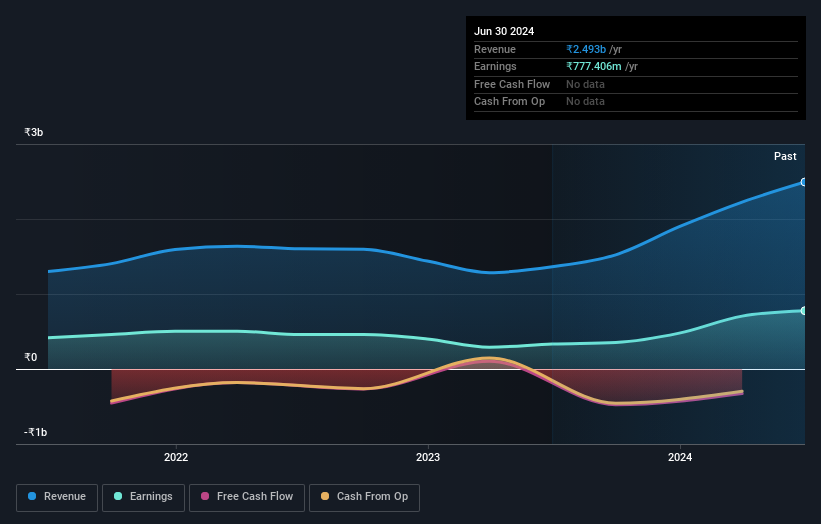Ashok Jain Arihant Capital Markets Limited's (NSE:ARIHANTCAP) CEO is the most bullish insider, and their stock value gained 18%last week
Key Insights
- Significant insider control over Arihant Capital Markets implies vested interests in company growth
- A total of 2 investors have a majority stake in the company with 55% ownership
- Past performance of a company along with ownership data serve to give a strong idea about prospects for a business
If you want to know who really controls Arihant Capital Markets Limited (NSE:ARIHANTCAP), then you'll have to look at the makeup of its share registry. The group holding the most number of shares in the company, around 75% to be precise, is individual insiders. In other words, the group stands to gain the most (or lose the most) from their investment into the company.
As a result, insiders were the biggest beneficiaries of last week’s 18% gain.
In the chart below, we zoom in on the different ownership groups of Arihant Capital Markets.
Check out our latest analysis for Arihant Capital Markets

What Does The Lack Of Institutional Ownership Tell Us About Arihant Capital Markets?
Small companies that are not very actively traded often lack institutional investors, but it's less common to see large companies without them.
There are multiple explanations for why institutions don't own a stock. The most common is that the company is too small relative to funds under management, so the institution does not bother to look closely at the company. It is also possible that fund managers don't own the stock because they aren't convinced it will perform well. Arihant Capital Markets' earnings and revenue track record (below) may not be compelling to institutional investors -- or they simply might not have looked at the business closely.

Arihant Capital Markets is not owned by hedge funds. Looking at our data, we can see that the largest shareholder is the CEO Ashok Jain with 32% of shares outstanding. In comparison, the second and third largest shareholders hold about 23% and 5.5% of the stock. Interestingly, the third-largest shareholder, Arpit Jain is also a Member of the Board of Directors, again, indicating strong insider ownership amongst the company's top shareholders.
A more detailed study of the shareholder registry showed us that 2 of the top shareholders have a considerable amount of ownership in the company, via their 55% stake.
While it makes sense to study institutional ownership data for a company, it also makes sense to study analyst sentiments to know which way the wind is blowing. We're not picking up on any analyst coverage of the stock at the moment, so the company is unlikely to be widely held.
Insider Ownership Of Arihant Capital Markets
While the precise definition of an insider can be subjective, almost everyone considers board members to be insiders. Company management run the business, but the CEO will answer to the board, even if he or she is a member of it.
I generally consider insider ownership to be a good thing. However, on some occasions it makes it more difficult for other shareholders to hold the board accountable for decisions.
It seems that insiders own more than half the Arihant Capital Markets Limited stock. This gives them a lot of power. Given it has a market cap of ₹12b, that means they have ₹9.2b worth of shares. Most would argue this is a positive, showing strong alignment with shareholders. You can click here to see if those insiders have been buying or selling.
General Public Ownership
With a 23% ownership, the general public, mostly comprising of individual investors, have some degree of sway over Arihant Capital Markets. This size of ownership, while considerable, may not be enough to change company policy if the decision is not in sync with other large shareholders.
Next Steps:
It's always worth thinking about the different groups who own shares in a company. But to understand Arihant Capital Markets better, we need to consider many other factors. For example, we've discovered 2 warning signs for Arihant Capital Markets that you should be aware of before investing here.
Of course, you might find a fantastic investment by looking elsewhere. So take a peek at this free list of interesting companies.
NB: Figures in this article are calculated using data from the last twelve months, which refer to the 12-month period ending on the last date of the month the financial statement is dated. This may not be consistent with full year annual report figures.
Have feedback on this article? Concerned about the content? Get in touch with us directly. Alternatively, email editorial-team (at) simplywallst.com.
This article by Simply Wall St is general in nature. We provide commentary based on historical data and analyst forecasts only using an unbiased methodology and our articles are not intended to be financial advice. It does not constitute a recommendation to buy or sell any stock, and does not take account of your objectives, or your financial situation. We aim to bring you long-term focused analysis driven by fundamental data. Note that our analysis may not factor in the latest price-sensitive company announcements or qualitative material. Simply Wall St has no position in any stocks mentioned.
 Index Options
Index Options CME Group
CME Group Nasdaq
Nasdaq Cboe
Cboe TradingView
TradingView Wall Street Journal
Wall Street Journal